Wikipedia:Picture of the day/November 2006
|
Featured picture tools: |
These featured pictures, as scheduled below, appeared as the picture of the day (POTD) on the English Wikipedia's Main Page in November 2006.
You can add an automatically updating POTD template to your user page using {{Pic of the day}} (version with blurb) or {{POTD}} (version without blurb). For instructions on how to make custom POTD layouts, see Wikipedia:Picture of the day.Purge server cache
November 1 - Wed
[edit]
|
View of Lake Lugano and the city of Lugano, Switzerland, from the foot of Monte San Salvatore in 1909. Lying on the border of Italy, Lugano is located in the Italian-speaking canton of Ticino. This image was taken before the advent of color film. It is composed of three monochrome pictures shot through different colored filters and could only be viewed at the time via projection. It was only with digital image processing that the images could be satisfactorily combined into one. Photo credit: Sergei Mikhailovich Prokudin-Gorskii |
Text version ( view - edit - talk - history ) — Condensed version ( view - edit )
Column version ( view - edit ) — Row version ( view - edit )
November 2 - Thu
[edit]
|
Earthrise, the first occasion in which humans saw the Earth seemingly rising above the surface of the Moon, taken during the Apollo 8 mission on December 24 1968. This view was seen by the crew at the beginning of its fourth orbit around the Moon, although the very first photograph taken was in black-and-white. Note that the Earth is in shadow here. A photo of a fully lit Earth would not be taken until the Apollo 17 mission. Photo credit: William Anders |
Text version ( view - edit - talk - history ) — Condensed version ( view - edit )
Column version ( view - edit ) — Row version ( view - edit )
November 3 - Fri
[edit]
|
A Long-billed Curlew (Numenius americanus), seen at Fishing Pier, Goose Island State Park, Texas. Native across the United States and Canada, the population of this member of the Curlew family was significantly reduced at the end of the 19th century by hunting. Numbers have rebounded somewhat in more recent times. Photo credit: Alan D. Wilson |
Text version ( view - edit - talk - history ) — Condensed version ( view - edit )
Column version ( view - edit ) — Row version ( view - edit )
November 4 - Sat
[edit]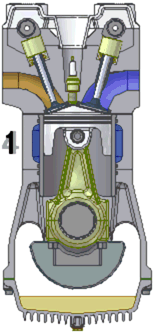
|
Animation showing the four-stroke cycle of an internal combustion engine, the most commonly used for automotive and industrial purposes today. The cycle is characterized by four strokes, or straight movements alternately, back and forth, of a piston inside a cylinder: (1) the intake stroke, (2) the compression stroke, (3) the power stroke, and (4) the exhaust stroke. Animation credit: UtzOnBike |
Text version ( view - edit - talk - history ) — Condensed version ( view - edit )
Column version ( view - edit ) — Row version ( view - edit )
November 5 - Sun
[edit]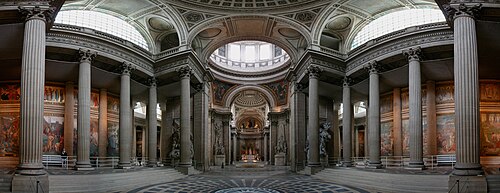
|
| Panoramic shot of the interior of the Panthéon, a church and burial place located in the Latin Quarter of Paris, France. Originally built as a church dedicated to St. Genevieve, the National Convention ordered it to be changed from a church to a mausoleum for the interment of great Frenchmen. Among those buried in its necropolis are Voltaire, Rousseau, Marat, Victor Hugo, Émile Zola, Jean Moulin, Marie Curie, and Louis Braille.
Photo credit: Jean-Pierre Lavoie/Ravedave |
Text version ( view - edit - talk - history ) — Condensed version ( view - edit )
Column version ( view - edit ) — Row version ( view - edit )
November 6 - Mon
[edit]
|
An overlay diagram showing four of the largest wide-body aircraft ever built, the Hughes H-4 Hercules (the "Spruce Goose", the aircraft with the greatest wingspan), the Antonov An-225 Mriya (the largest freight aircraft), the Airbus A380-800 (the largest passenger aircraft), and the Boeing 747-8 Intercontinental (soon to be the largest version of the 747). Diagram credit: Clem Tillier |
Text version ( view - edit - talk - history ) — Condensed version ( view - edit )
Column version ( view - edit ) — Row version ( view - edit )
November 7 - Tue
[edit]
|
The Weedy sea dragon (Phyllopteryx taeniolatus) is a marine fish related to the seahorse. It is native to the shallow water around the southern coastline of Australia, between Port Stephens and Geraldton, as well as Tasmania. Weedy sea dragons are named for the weed-like projections on their bodies, which serve to camouflage them as they move among the seaweed beds where they are usually found. Photo credit: Richard Ling |
Text version ( view - edit - talk - history ) — Condensed version ( view - edit )
Column version ( view - edit ) — Row version ( view - edit )
November 8 - Wed
[edit]
|
A female mallard and ducklings. Mallards are probably the best-known of all ducks. The breeding male is unmistakable, with a green head, black rear end and blue speculum feathers edged with white. The female mallard is light brown and can be distinguished from other ducks, by the distinctive speculum. Photo credit: Alan D. Wilson/Fir0002 |
Text version ( view - edit - talk - history ) — Condensed version ( view - edit )
Column version ( view - edit ) — Row version ( view - edit )
November 9 - Thu
[edit]
|
Map of the Giza pyramid complex, located 20 km (12.5 mi) southwest of Cairo, Egypt. This Ancient Egyptian necropolis consists of the Great Pyramid, the Pyramid of Khafre, and the Pyramid of Menkaure, along with a number of smaller satellite edifices, known as "queens" pyramids, causeways and valley pyramids, and most noticeably the Great Sphinx. The site has attracted visitors and tourists since classical antiquity, when these Old Kingdom monuments were already over 2,000 years old. Map credit: MesserWoland |
Text version ( view - edit - talk - history ) — Condensed version ( view - edit )
Column version ( view - edit ) — Row version ( view - edit )
November 10 - Fri
[edit]
|
Photograph from the mid-1870s of a pile of American Bison skulls waiting to be ground for fertilizer. Bison were hunted almost to extinction in the nineteenth century and were reduced to a few hundred head by the mid-1880s, from which all the present day's managed herds are descended. The commercial take arguably was anywhere from 2,000 to 100,000 animals per day, though there are no statistics available. Photo credit: Burton Historical Collection, Detroit Public Library |
Text version ( view - edit - talk - history ) — Condensed version ( view - edit )
Column version ( view - edit ) — Row version ( view - edit )
November 11 - Sat
[edit]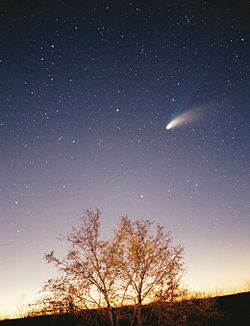
|
Comet Hale-Bopp sails across the sky in the vicinity of Pazin in Istria, Croatia. To the lower right of the comet the Andromeda Galaxy is also faintly visible. The comet was visible to the naked eye for a record 18 months, twice as long as the Great Comet of 1811. At perihelion, it shone brighter than any star in the sky except Sirius, and its two tails stretched 30-40 degrees across the sky. The passage of Hale-Bopp was notable also for inciting a degree of panic about comets not seen for decades. Rumours that the comet was being followed by an alien spacecraft gained remarkable currency, and inspired a mass suicide among followers of the Heaven's Gate cult. Photo credit: Philipp Salzgeber |
Text version ( view - edit - talk - history ) — Condensed version ( view - edit )
Column version ( view - edit ) — Row version ( view - edit )
November 12 - Sun
[edit]
|
| Panoramic view of the Dingle Peninsula, the westernmost point of the Republic of Ireland. The peninsula is named after the town of Dingle and is the location of numerous prehistoric and early medieval remains, for example the Gallarus Oratory in the very west of the peninsula near the village of Baile an Fheirtéaraigh in Ard na Caithne.
Photo credit: Steve Ford Ellis/Howcheng |
Text version ( view - edit - talk - history ) — Condensed version ( view - edit )
Column version ( view - edit ) — Row version ( view - edit )
November 13 - Mon
[edit]
|
Morphology of a sterile female worker wasp. It can be identified as a female by both the number of divisions on its antenna and by its sting. This particular wasp is very close in likeness to a yellowjacket found commonly all around the world. Diagram credit: WikipedianProlific |
Text version ( view - edit - talk - history ) — Condensed version ( view - edit )
Column version ( view - edit ) — Row version ( view - edit )
November 14 - Tue
[edit]
|
The Habanero chile is the most intensely spicy chile pepper of the Capsicum genus. Most habaneros rate 200,000–300,000 Scoville heat units (SHU), and the Red Savinas variety, at 580,000 SHU, holds the record for being the "World's Hottest Spice". Photo credit: André Karwath |
Text version ( view - edit - talk - history ) — Condensed version ( view - edit )
Column version ( view - edit ) — Row version ( view - edit )
November 15 - Wed
[edit]
|
The eastern face of the Matterhorn, reflected in the Riffelsee. Perhaps the most familiar mountain in the European Alps, the Matterhorn sits on the border between Switzerland and Italy. The peak has four faces, facing the four compass points, with the north and south faces meeting to form a short east-west summit ridge. Despite its prominence in a general sense, the Matterhorn is not among the top 100 mountains in the Alps measured by topographic prominence. Several of its close neighbors, including Monte Rosa, the Dom, Liskamm and the Weisshorn, have higher summits. Photo credit: Dirk Beyer/Quasipalm |
Text version ( view - edit - talk - history ) — Condensed version ( view - edit )
Column version ( view - edit ) — Row version ( view - edit )
November 16 - Thu
[edit]
|
An early colour photograph of the Emir of Bukhara, Mohammed Alim Khan, in 1911, taken by Sergei Mikhailovich Prokudin-Gorskii as part of his work to document the Russian Empire from 1909 to 1915. Alim Khan, a direct descendant of Genghis Khan, was the last emir of the Manghit dynasty. He reigned from 1911 to 1920, fleeing to Afghanistan when the Bolsheviks annexed Bukhara and proclaimed the Bukharan People's Republic. Photo credit: Sergei Mikhailovich Prokudin-Gorskii |
Text version ( view - edit - talk - history ) — Condensed version ( view - edit )
Column version ( view - edit ) — Row version ( view - edit )
November 17 - Fri
[edit]
|
Migrant Mother, Dorothea Lange's 1936 photograph of Florence Owens Thompson and her daughters in Nipomo, California, became the most famous image of the Great Depression in the United States. It is one of the classic photographs of the 20th century, and is now an icon of resilience in the face of adversity. In the 1930s, the FSA employed several photographers to document the effects of the Great Depression on the population of America. Many of the photographs can also be seen as propaganda images to support the U.S. government's policy distributing support to the worst affected, poorer areas of the country. Photo credit: Dorothea Lange |
Text version ( view - edit - talk - history ) — Condensed version ( view - edit )
Column version ( view - edit ) — Row version ( view - edit )
November 18 - Sat
[edit]
|
A Golden-mantled Ground Squirrel (Spermophilus lateralis) in Mount Rainier National Park, its cheek pouches full of food. This species of squirrel is native throughout North America and can be found in a wide variety of forest habitats as well as rocky meadows, and even sagebrush flats. It is similar to a chipmunk not only in appearance but behavior as well. Photo credit: K.lee |
Text version ( view - edit - talk - history ) — Condensed version ( view - edit )
Column version ( view - edit ) — Row version ( view - edit )
November 19 - Sun
[edit]
|
The Cheetah (Acinonyx jubatus) is an atypical member of the cat family that hunts by speed rather than by stealth or pack tactics. It is the fastest of all land animals and can reach speeds of up to 70 mph (120 km/h) in short bursts up to 500 yards (500 m). The cheetah is well known for its amazing acceleration (0 to 100 km/h (~62 mph) in 3.5 seconds which is faster than the Mercedes-Benz SLR McLaren, the Lamborghini Murciélago and the F/A-18 Hornet). Photo credit: Mark Probst |
Text version ( view - edit - talk - history ) — Condensed version ( view - edit )
Column version ( view - edit ) — Row version ( view - edit )
November 20 - Mon
[edit]
|
Animated cut-away view of a radial engine, a configuration of internal combustion engine, in which the cylinders are arranged pointing out from a central crankshaft like the spokes on a wheel. This configuration was formerly very commonly used in aircraft engines before being superseded by turboshaft and turbojet engines. Animation credit: Duk |
Text version ( view - edit - talk - history ) — Condensed version ( view - edit )
Column version ( view - edit ) — Row version ( view - edit )
November 21 - Tue
[edit]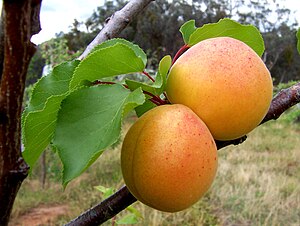
|
The apricot (Prunus armeniaca) is a fruit-bearing tree native to China. It is related to the plum, and classified with it in the subgenus Prunus of the genus Prunus. The fruit (pictured here) appears similar to a peach or nectarine, with a colour ranging from yellow to orange and sometimes a red cast; its surface is smooth and nearly hairless. Apricots are stone fruit (drupes), and have only one seed each, often called a "stone". Photo credit: Fir0002 |
Text version ( view - edit - talk - history ) — Condensed version ( view - edit )
Column version ( view - edit ) — Row version ( view - edit )
November 22 - Wed
[edit]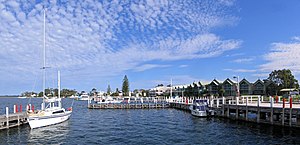
|
A stitched panorama of Metung Wharf on Bancroft Bay, Gippsland Lakes, Metung, Victoria, Australia. Metung is a small town located 315 km (197 mi) east of Melbourne, a popular holiday spot, near to larger towns, but off any main routes itself. Photo credit: John O'Neill |
Text version ( view - edit - talk - history ) — Condensed version ( view - edit )
Column version ( view - edit ) — Row version ( view - edit )
November 23 - Thu
[edit]
|
A portrait of Ulysses S. Grant, the 18th President of the United States, taken sometime between 1870 and 1880. Grant gained fame as a general during the American Civil War, leading him to a landslide victory in the 1868 election. However, his presidency was marked by corruption and an economic depression, causing Grant to be ranked in the lowest quartile of U.S. presidents. In recent years, however, his reputation as president has improved somewhat among scholars impressed by his support for civil rights for African Americans. Photo credit: Mathew Brady or Levin C. Handy |
Text version ( view - edit - talk - history ) — Condensed version ( view - edit )
Column version ( view - edit ) — Row version ( view - edit )
November 24 - Fri
[edit]
|
Delicate Arch is a freestanding natural arch and the signature landmark of Arches National Park near Moab, Utah, USA. Surprisingly, the arch played no part in the original designation of the area as a U.S. National Monument in 1929, and was not included within the original monument boundary. It was added when the monument was enlarged in 1938. Photo credit: National Park Service |
Text version ( view - edit - talk - history ) — Condensed version ( view - edit )
Column version ( view - edit ) — Row version ( view - edit )
November 25 - Sat
[edit]
|
Hokusai's The Great Wave off Kanagawa from his seminal work 36 Views of Mount Fuji is one of the most iconic representations of the Japanese style of art known as ukiyo-e. The scene is of a great wave (often mistaken for a tsunami) about to devour the men and boats, with the distant Mount Fuji minimized by the size of the wave. Image credit: Hokusai |
Text version ( view - edit - talk - history ) — Condensed version ( view - edit )
Column version ( view - edit ) — Row version ( view - edit )
November 26 - Sun
[edit]
|
Hills southwest of Sanandaj near the village of Kilaneh, Kurdistan Province, Iran. This province, not to be confused with the greater geographical area of Iranian Kurdistan, is located on the border with Iraq, and is one of the most mountainous regions in Iran. It is a popular tourist destination, featuring mountaineering, skiing and water sports. Photo credit: Kuresh Anbari |
Text version ( view - edit - talk - history ) — Condensed version ( view - edit )
Column version ( view - edit ) — Row version ( view - edit )
November 27 - Mon
[edit]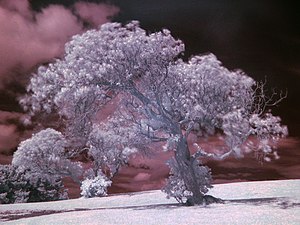
|
An infrared (IR) photograph of a tree. Not to be confused with thermal imaging, IR photography is accomplished with an infrared filter, which lets infrared light pass through to the camera but blocks all or virtually all of the visible light spectrum (and thus looks black). The effect is mainly caused by foliage (like tree leaves and grass) strongly reflecting in the same way light is reflected from snow. Photo credit: Daniel Schwen |
Text version ( view - edit - talk - history ) — Condensed version ( view - edit )
Column version ( view - edit ) — Row version ( view - edit )
November 28 - Tue
[edit]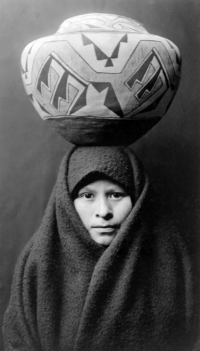
|
A head-and-shoulders portrait of a Zuni girl with a pottery jar on her head, circa 1903. The Zuni are a Native American tribe, one of the Pueblo peoples, who live beside the Zuni River, in western New Mexico, United States. The Zuni language is unique and unrelated to the languages of the other Pueblo peoples. The Zuni continue to practice their traditional shamanistic religion with its regular ceremonies and dances and an independent mythology. Archaeological evidence shows they have lived in their present location for about 1,300 years. Photo credit: Edward S. Curtis |
Text version ( view - edit - talk - history ) — Condensed version ( view - edit )
Column version ( view - edit ) — Row version ( view - edit )
November 29 - Wed
[edit]
|
A footbridge crossing a portion of the Rogue River near Prospect, Oregon, United States. The river originates from within Crater Lake National Park, running 215 miles (344 km), of which 84 miles (134 km) is a designated National Wild and Scenic River. It is popular among whitewater rafters, featuring Class IV rapids. Photo credit: Hamad Darwish |
Text version ( view - edit - talk - history ) — Condensed version ( view - edit )
Column version ( view - edit ) — Row version ( view - edit )
November 30 - Thu
[edit]
|
A composite photo of the Orion Nebula, the closest region of star formation to Earth. It is composed of 520 separate images and NASA calls it "one of the most detailed astronomical images ever produced". The nebula is located below Orion's Belt and is visible to the naked eye at night. It is one of the most scrutinized and photographed objects in the night sky, and is among the most intensely-studied celestial features. Photo credit: Hubble Space Telescope |
Text version ( view - edit - talk - history ) — Condensed version ( view - edit )
Column version ( view - edit ) — Row version ( view - edit )
Picture of the day archives and future dates
